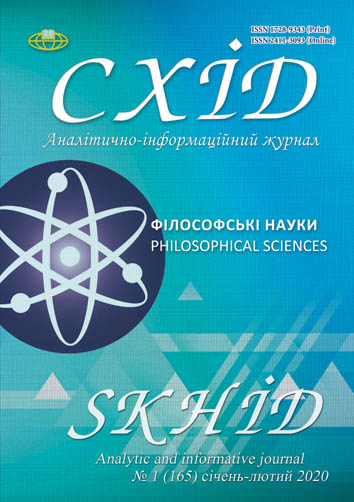Does the social teaching of the Catholic Church contain the modernized elements of the medieval doctrina de duo gladi?
DOI:
https://doi.org/10.21847/1728-9343.2020.1(165).197093Keywords:
Catholic Church, Doctrine, «two swords», Diplomacy, Catholic Social Doctrine, Pontiff, Geopolitics, State, PoliticsAbstract
The purpose of the medieval Catholic political and theological doctrine of the "two swords" was to ground the thesis of the supremacy of the pope's authority over political power, and this enabled the spiritual institute to claim on the issues of secular and state character. However, as a result of reform processes in Europe, the doctrine of the "two swords" has been minimized but it assumes that certain elements of the doctrine could be preserved till our time and used by the Church in a time-adapted form. The solution of this problem is based on the study of the social doctrines of the Roman Catholic Church, as far as it is the Catholic social doctrine that has absorbed a number of secular issues, and this enables the Church to influence on civil society by addressing problems in the economic, political and social realms. As the Doctrine of the Two Swords contained a political component, the main focus of the article is made on the study of the theoretical and practical steps of the Roman Catholic Church in the diplomatic and geopolitical arena which in some ways may be consistent with the provisions of medieval doctrine. However, by paying attention to the socio-political aspects, the Church reserves the right to exercise moral and ethical control over both society and government, thereby demonstrating that the spiritual institute obtains an important role in shaping the architecture of the modern world. Therefore, the purpose of the article is to investigate Catholic social doctrine and to identify its elements that can be interpreted as a modern realization of the medieval "two swords" theory.Downloads
References
Aronov, E. and Gostev, A. (2015). Big politics of the pope. Radio Freedom. Retrieved from https://www.svoboda.org/a/27261162.html (In Russian).
Chetverykova, O. N. (2011). Changes to the Vatican, or the Pope's Conspiracy against Christianity. Moscow: Eksmo (In Russian).
Compendium of the Social Doctrine of the Church (2008). Kyiv: Kairos (In Ukrainian).
Filippov, B. (2017). Cardinal Stefan Wyszyński - Initiator and Critic of Vatican's “Eastern Policy”, 1945-1978. Hosudarstvo, relyhyia, tserkov v Rossii i za rubezhom, 35(1): 98-122. DOI: https://doi.org/10.22394/2073-7203-2017-35-1-98-122 (In Russian).
Golubiev, K. (2012). The positioning of Catholic social doctrine in the encyclicals of Pope Ivan Paul II. Khristianskoe chtenie (Christian reading), 6: 95-130 (In Russian).
Kanevskyi, K. (2003). The Social Doctrine of the Catholic Church. «Rossyiskaia yustytsyia» (Russian justice). 4. Retrieved from https://www.sova-center.ru/religion/publications/2003/12/d1475/?print=1 (In Russian).
Kondrusevych, T. (2005). Church and State in the Teachings of the Catholic Church. Svoboda sovesti v Rossii: istoricheskij i sovremennyj aspekty (Freedom of conscience in Russia: historical and modern aspects), 2. Retrieved from https://rusoir.ru/03print/03print-04/03print-04-02/ (In Russian).
Leo XIII (1891). Rerum Novarum. Libreria Editrice Vaticana: the Holy See. Retrieved from http://w2.vatican.va/content/leo-xiii/en/encyclicals/documents/hf_l-xiii_enc_15051891_rerum-novarum.pdf.
Ratnikov, A. (2014). Word and Deal: How did the Pope influence politics? RBC. December 18. Retrieved from https://www.rbc.ru/photoreport/18/12/2014/5492de2a9a79476a065c08c3 (In Russian).
Sardarian, H. T. (2016). The liberal reversal of Catholic social doctrine during the pontificate of Leo XIII. Pravo i polytyka (Law and politics), 11: 1433-1439. DOI: https://doi.org/10.7256/1811-9018.2016.11.20685 (In Russian).
Sardarian, H. T. (2017). Political Doctrine of Pope John XXIII. Polytyka i Obshchestvo (Politics and Society), 11: 155-162. DOI: https://doi.org/10.7256/2454-0684.2017.11.24672 (In Russian).
Yarotskyi, P. (2001). Features of the development of social teaching of Catholicism. Ukrainske relihiieznavstvo (Ukrainian Religious Studies), 20, 55-63 (In Ukrainian).
Yevdokymova, T. (2000). Christian Social Teaching: Dialogue with the Modern World. Ukrainske relihiieznavstvo (Ukrainian Religious Studies), 15: 13-22 (In Ukrainian).
Downloads
Published
How to Cite
Issue
Section
License
Copyright (c) 2020 Dmytro Honcharenko

This work is licensed under a Creative Commons Attribution-NonCommercial-NoDerivatives 4.0 International License.
1. Authors bear responsibility for the accuracy of facts, quotations, numbers and names used.
2. Manuscripts are not sent back.
3. The publisher does not always agree with the authors' opinion.
4. The authors reserve the right to authorship of the work and pass the first publication right of this work to the journal under the terms of a Creative Commons Attribution-NonCommercial-NoDerivatives 4.0 International License. This license allows others to distribute (copy) the published work for non-commercial purposes, provided there is mandatory attribution to its authors and a link to the first publication in our journal.
5. The authors have the right to conclude separate supplement agreements that relate to non-exclusive work distribution in the form in which it has been published by the journal (for example, to upload the work to the online storage of the journal or publish it as part of a monograph), provided that the reference to the first publication of the work in this journal is included.

